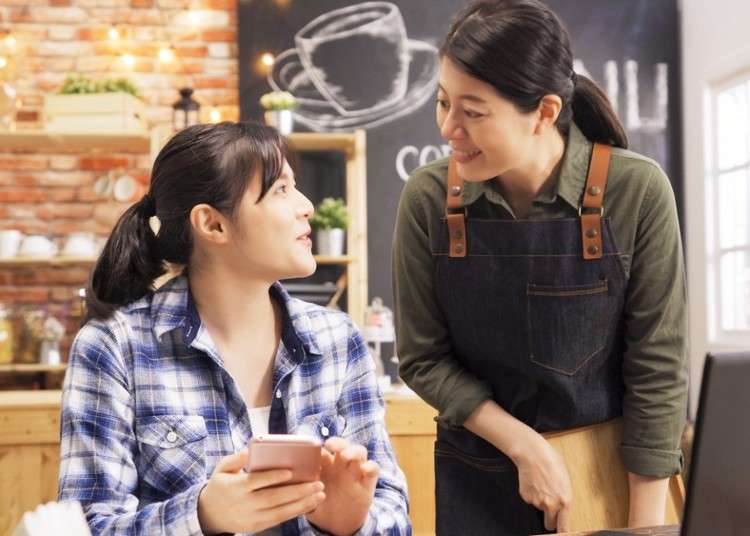
One of the pleasures of traveling overseas is in being able to use the local language of the foreign country. Whether it be for shopping, securing lodging, or just getting about, being able to communicate with the local people will bring you much closer to them. Here are some useful Japanese phrases you can use when traveling in Japan. If you remember them, it will certainly make your stay in Japan a more rewarding one.
Let’s take a look at several scenarios you are likely to encounter. Read these as though you were actually encountering them.
■ At the Airport
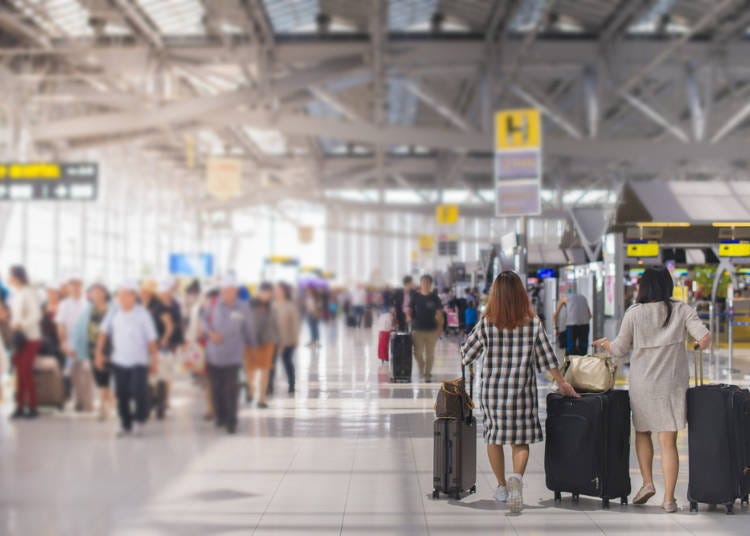
The first hurdle is when you land in Japan. Here are some useful phrases you can use at the airport.
・Changing money

Probably the first thing that you will want to do after you arrive is to obtain local currency for your stay. For those who did not exchange money in their home country before coming to Japan, there are exchanges in the airport where you can do that.
Ryogai onegaishimasu.
[I would like to change some money.]
It is possible to exchange money in various places, such as at exchange windows in the airport, banks, post offices, and cash voucher shops in most cities. People will understand if just say Ryogai.
■ At your accommodation
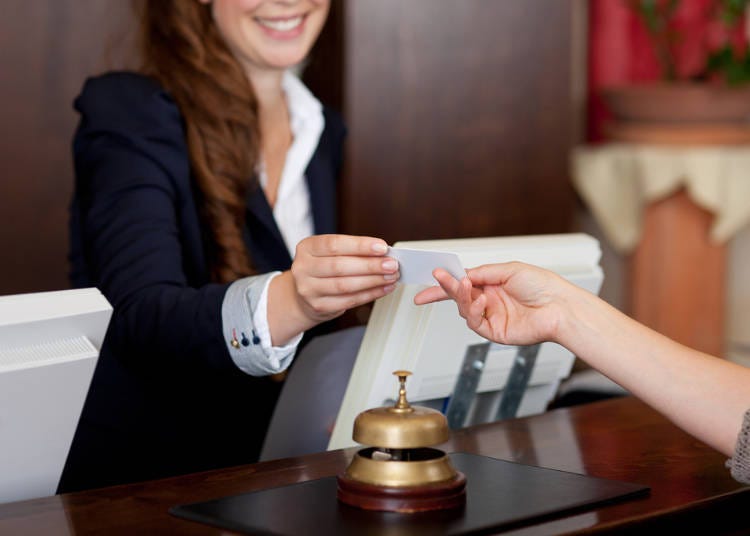
Your accommodation will serve as a travel base during your stay in Japan. During your stay you can ask for any sort of assistance at the front desk. Here are some phrases you can use at that time.
・Check-in
The following is a conversation you may have at the counter when you are preparing to board a flight for which you had made a reservation.
You: Chekkuin onegaishimasu. [May I check in?]
Staff: Namae o oshiete kudasai. [Please tell me your name.]
You: XXXX desu. [My name is XXXX.]
Checking in in Japanese is the same, isn’t it? You can also use that phrase when checking into a hotel or inn.
Some other useful phrases include:
Would it be possible to change my room? - Heya o kaete moraemasu ka?
Please lend me a humidifier. - Kashitsuki o kashite kudasai.
Please give me a 7 o’clock morning call. - Shichiji ni mohningu kohru onegaishimasu.
Please tell me the password for the Wi-Fi. - Waifai no pasuwahdo o oshiete kudasai.
Where can I get breakfast? - Asa gohan wa doko de taberaremasu ka?
From what time? - Nanji kara desu ka?
Many hotels have full-time staff who can speak foreign languages, however in small inns in the countryside, that is not the case, so knowing these phrases ahead of time is helpful.
■ Walking around town
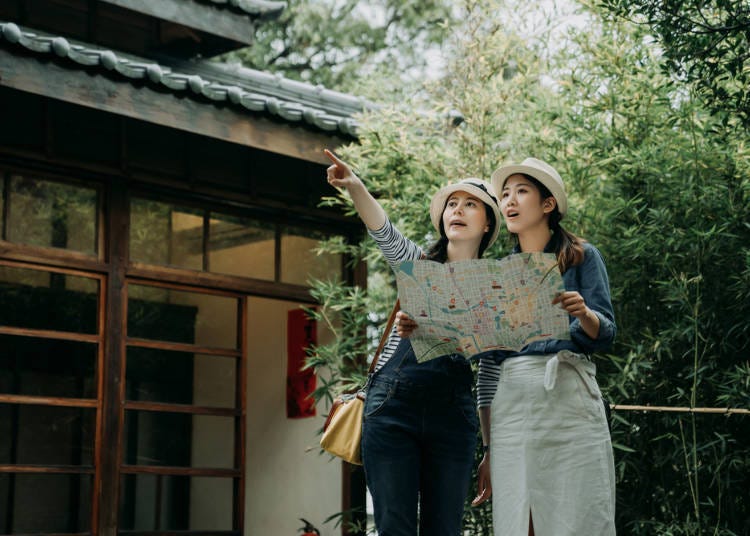
When traveling about you are likely to encounter all sorts of scenarios. Here are some phrases we think might be useful in the following situations.
・Asking directions to a destination
Setting out on your long-awaited tour of Japan. When traveling around the city, there may be times when you are unsure of how to get to where you would like to go. At that time you can use the following phrases when asking passersby for help.
You: Jei Aru no Shinjuku Eki wa doko desu ka? [Where is JR Shinjuku Station?] Kanko Annaijo wa doko desu ka? [Where is the tourist information office?]
Counterpart: Kono michi o massugu itte kudasai. [Go straight along this road.]
Useful expressions for when you are looking for the place to take a taxi, bus, or train are noriba [place to board] and doko [where] for OO [means of transportation)]. Just those two words should be enough for the listener to understand. If the reply is massugu [straight ahead], just go in that direction. If the reply is migi [right] or hidari [left] you then will need to turn in that direction.
・Verifying if you are going in the right direction
There may be times when you are not sure whether you are traveling in the right direction. Announcements in English have become more common recently, but still you sometimes may want to ask someone if you are going in right direction. Here is an example of how you can do that.
You: Kono densha de Shibuya ni Ikemasu ka? [Does this train go to Shibuya?]
Counterpart: Nagata Eki de Hanzomon-sen ni norikaete kudasai. [You need to change to the Hanzomon Line at Nagatacho Station.]
The word norikae [transfer] is important to remember when you need to change trains or buses to get to your destination. Also trains and buses go to different destinations using the same route, so before you board, it is best to ask someone if you are boarding the correct one.

・Asking people to take your picture
While you are walking about you may see many good places for taking pictures. In addition to taking selfies, you might want to ask someone to take a photo of you, too. Here is a polite way you can ask someone to do that.
You: Shashin o totte kudasai. [Please take my picture.]
Counterpart: Doh toreba ii desu ka? [How shall I take it?}
You: Otera no zentai o irete kudasai. [Please include all of the temple.]
After you have had your photo taken, it is polite to offer to take the other person’s photo.
You: Shashin o torimashoh ka? [Shall I take your photo?]
Counterpart: Onegaishimasu. [Yes, please.]
・Asking for information
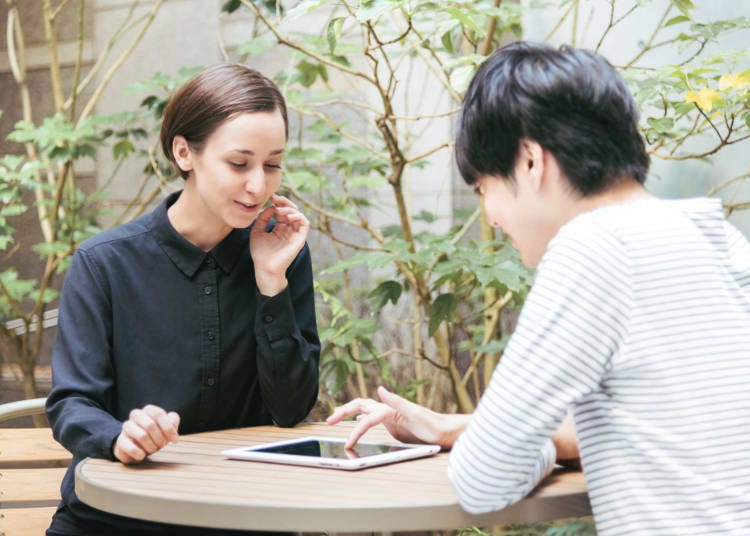
The following phrases are useful when conversing with a Japanese. These are good for asking about places to see which only local residents know about.
Doko de shashin o toru no ga osusume desu ka? [Can you recommend a good spot for taking pictures?]
Anaba no resutoran wa arimasu ka? [Can you recommend a restaurant off the beaten track?]
■ When shopping
Many people come to Japan for the purpose of going shopping. The following phrases are useful for when you are looking for something in particular.

・When making a purchase
Shopping centers have many attractive items on sale. First let’s imagine a situation where you are shopping for clothes.
What is popular? - Dore ga ninki desu ka?
Which do you recommend? - Osusume wa dore desu ka?
Do you have ____? - ____ wa arimasu ka?
Where is ____? - ____ was doko ni arimasu ka?
Please show me this. - Kore o misete kudasai.
Do you have this in a different color? - Hoka no iro wa arimasu ka?
Do you have this in a larger (smaller) size? - Motto ohkina (chiisana) saizu wa arimasu ka?
Can I try it on? - Shichaku shite mo i desu ka?
How much is this? - Kore wa ikura desu ka?
Can I use a credit card? - Kurejitto kahdo wa tukaemasu ka?
・When buying souvenirs

These phrases are often used in souvenir shops.
Kore o ju ko kudasai. [Please give me ten of these.]
(Kowake yo no) fukuro o ju mai kudasai. [Please give me ten bags (for putting the purchase into separate bags).]
Incidentally, many small shops in Japan still do not accept credit cards. Compared to other countries, the custom of paying in cash is still strong in Japan, so it is a good idea when shopping to be prepared to be able to pay in cash.
■ At restaurants
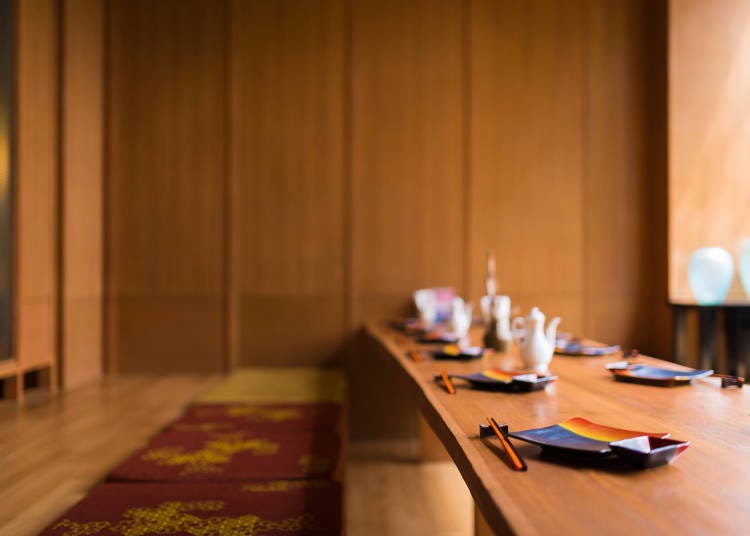
One of the pleasures of traveling is dining so here are some phrases you can use then. We’ll take a look at phrases you can use for when entering, ordering, dining, and then leaving the restaurant. Some people have dietary restrictions, such as vegans and Muslims, so these phrases would be good to remember.
At the entrance, see if tables are free:
Seki wa arimasu ka? [Do you have any seats?]
Once you are seated you will look at the menu. For vegans, Muslims, and others who have restrictions on what they can eat, the following phrases are especially useful.
Watakushi wa vegan (Musurimu) desu. [I am a vegan (Muslim).]
Vegan (hararu) menyu wa arimasu ka? [Do you have a vegan (halal) menu?]
Tempura gozen niwa nani ga haitte imasu ka? [What is in the Tempura set meal?]
When you are ready to pay the bill, use this phrase.
Kaikei o onegaishimasu. [Check, please.]
If you are going Dutch, with each person paying their own share, then begin that phrase with betsu betsu de [separate checks, please]. Please be careful to note that in some restaurants separate checks are not possible and the entire bill must be paid at once.
■ Summary

Recently there has been a large increase in foreign visitors to Japan so many tourist areas and restaurants have staff who can speak foreign languages. But in small shops in rural areas that is still not the case, so you will need to know some Japanese to communicate well.
Knowing just a few Japanese phrases will definitely make your stay in Japan a more pleasant and rewarding one.
When you visit, try to use the phrases we have introduced as we are sure that you will find that they will make interacting with local people more enjoyable.
*Prices and options mentioned are subject to change.
*Unless stated otherwise, all prices include tax.
Popular Tours & Activitiess
-
Ad

Ohta’s Isan Gets a Refresh: Introducing the New Ohta’s Isan S and Ohta’s Isan <Sachet> S with Updated Packaging and Improved Benefits
-
Ad

A Tokyo Souvenir with Soul: The Handcrafted Leather of Bunkoya Oozeki
-

Autumn in Japan 2025: Fall Foliage Forecast & Where to Enjoy the Colorful Leaves (+Tour Info)
-
Ad

Get Your Perfect Custom Suit at GINZA Global Style PREMIUM Ginza Honten: Choose from 5,000 Fabrics, Starting at 26,400 Yen (incl. tax)!
-

Best Things to Do and See Around Tokyo in September: Events and Festivals in Kanto
-
Ad

Just 2 Hours from Tokyo! Enjoy Ibaraki’s Breathtaking Ocean Views, Flowers & Autumn Leaves on Private Tours
Inspiration for Accommodations
-

Enjoy Mt. Fuji from the Comfort of Your Room! Recommended Ryokan with Mt. Fuji View
-

Stay Near the Cherry Blossoms! Hotels for Cherry Blossom Viewing in Tokyo
-

Family-Friendly Hotels with Free Shuttle to Disneyland: Convenient Access for a Magical Stay
-

Top Ranked Hakone Hotels with Mt. Fuji View: Enjoy Stunning Scenery from Your Private Space
-

Convenient Tokyo Hotels with Airport Shuttle: Ideal for Families and Heavy Luggage
-

Stunning Tokyo Tower View Hotels: Enjoy Spectacular Scenery from Your Private Space
-

Convenient Asakusa Hotels with Kitchens: Ideal for Extended Family Visits
-

Experience Luxury: Hakone's 10 Best Five-Star Accommodations
-

Enjoy Mt. Fuji Autumn Leaves! Top Hotels Near the Popular Autumn Leaves Corridor
-

Experience Hakone Fall Foliage from Your Room with Stunning Views
-

Kawaii Monster Cafe: Cute and Creepy Fun in Harajuku
-

Essential Tokyo: The Complete Guide to Ikebukuro Station
-

Meiji Shrine (Meiji Jingu): Exploring the Sacred Sanctuary of Peace in Bustling Tokyo
-

Takanotsume Tokyo: Japan's Weird Fashion Statements
-

Exploring Tokyo: 4 Must-Visit Spots around Tokyo Station
-

Ueno Ameyoko: Here's Where To Find Tokyo's 6 Best Street Food Shops!
- #best ramen tokyo
- #what to buy in ameyoko
- #what to bring to japan
- #new years in tokyo
- #best izakaya shinjuku
- #things to do tokyo
- #japanese nail trends
- #what to do in odaiba
- #onsen tattoo friendly tokyo
- #daiso
- #best sushi ginza
- #japanese convenience store snacks
- #best yakiniku shibuya
- #japanese fashion culture
- #best japanese soft drinks


















